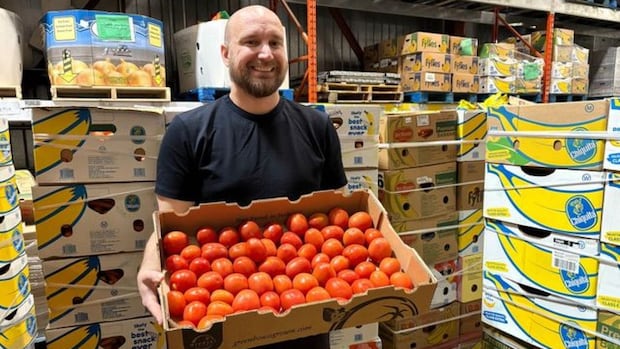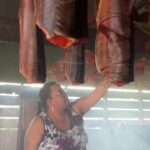British ColumbiaThink of it as a potluck — but, like, a potluck with diners 1,300 kilometres apart packing about 40 tonnes of food on the table.Food bank CEOs hope the fresh produce exchange will set the stage for future projectsLiam Britten · CBC News · Posted: Sep 03, 2025 6:00 AM EDT | Last Updated: 4 hours agoAccording to a joint statement, the Greater Vancouver Food Bank sent more than 1,300 kg of tomatoes donated by B.C. farmers to the Regina Food Bank. (Submitted by Regina Food Bank)Think of it as a potluck — but, like, a potluck with diners 1,300 kilometres apart, packing about 40 tonnes of food on the table.The Greater Vancouver Food Bank recently found itself with a big surplus of fresh produce grown by B.C. farmers. At the same time, the Regina Food Bank found itself with a similar abundance of pulses and grains grown in Saskatchewan.So, the two organizations took turns loading up a truck and delivering locally grown bounties to each other — about 20 tonnes in each direction — in what they say is a unique opportunity to diversify the offerings at Canadian food banks.The truck, loaded with B.C. produce, arrives in Regina. (Submitted by Regina Food Bank)”We know it is not a food shortage problem [in Canada], but it is a distribution problem and sometimes the good food is just not in the right spot for the folks who need it,” said John Bailey, CEO of the Regina Food Bank.”So what we endeavour to do with this is … make sure that there’s available product that both [food banks] can use, but that are local to the partner. So it really is about smoothing out the system.”Bailey’s counterpart at the Greater Vancouver Food Bank, David Long, said thanks to partnerships with local farmers and a provincial tax credit encouraging them to donate excess harvest to charity, about 80 per cent of the food they distribute is fresh.But sometimes, he continued, there’s an overabundance of fresh food and finding a taker is tough.”It depends on what their infrastructure is. Do they have loading docks? Do they have a warehouse? Do they have the refrigeration … And do they have the network that can actually distribute this fresh produce in time?” Long said.The Regina Food Bank was up to the task, he explained, and both he and Bailey hope this exchange is the first of many, and one that can be replicated by other food banks.Bailey explained that while food banks do share food as a matter of course, the opportunity to do it with fresh produce and less processed food is rare. The first trade from B.C. included vegetables like tomatoes, carrots and zucchinis, while Saskatchewan sent foods like lentils, oats and dried soup mix made from local crops.Long pegged the cost of the truck hired for the exchange at $6,000. He said his organization paid for using proceeds from custom-made juice pressed from surplus fruit.”Our intention with this project is to lay the groundwork for future projects across the provinces,” Long said.ABOUT THE AUTHORLiam Britten is an award-winning journalist for CBC Vancouver. You can contact him at liam.britten@cbc.ca or follow him on Twitter: @liam_britten.With files from Jeffery Tram
B.C., Sask. food banks trade local harvests, highlight distribution challenges











